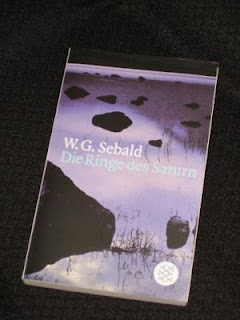*****
Alves & Co. and Other Stories, translated (as you can see from the photo) by the wonderful Margaret Jull Costa, is a slender volume of writings from one of Portugal's great writers. The collection consists of the titular novella and six short stories, bringing it up to about 170 pages in total, and it's an excellent starting point if you have never come across the writer before.
Alves & Co. introduces the reader to Godofredo Alves, a well-to-do businessman working in an import-export company. One warm day, he remembers that it is actually his wedding anniversary, and as his partner, Senhor Machado, is out of town on business, he decides to leave the office early and surprise his wife. Having ordered some delicacies from a local grocer's and bought a present for his beloved, he wanders happily home - only to get a very rude awakening...
Poor Alves immediately sends his wife back to her father's house and begins to consider how best to avenge his honour. However, despite his initial overblown ideas of dramatic recompense, he gradually begins to reconsider. Is giving up his position in society for revenge really worth it? Or could he, perhaps, learn to live with the pain of betrayal?
This novella is an excellent first encounter with Eça de Queiroz, and it is especially interesting to compare his ideas on the importance of redeeming one's honour with those of other great nineteenth-century European writers. Alves' friends' rather half-hearted attempts to arrange a duel can be contrasted with the rather more straight-forward proceedings in books like Phineas Finn or Effi Briest. Also, our Portuguese friend's attitude towards a cheating spouse bears little similarity to the way events unfold in novels such as Anna Karenina or Madame Bovary.
All of which may make the story a little less dramatic (and a lot shorter!) than many other works on the subject of infidelity. However, in terms of being true to human nature, perhaps Eça de Queiroz is closer to the mark. Alves is a great character, precisely because of his ordinariness: he is not particularly handsome, but by no means ugly; he is a man of passion, but not to the point of getting carried away:
"He read a lot of novels. Grand actions and grand Passions excited him. He occasionally felt that he was made for heroism, for tragedy. But these were dim, ill-defined feelings that stirred only rarely in the depths of the heart in which he kept them imprisoned." p.18 (Dedalus Books, 2012)
The words above are a good indicator as to how he will react when tragedy enters his life...
*****
Alves & Co. is an excellent novella, one I greatly enjoyed reading, but it did tend to overshadow the other stories in this collection (which I find is often the case when one story takes up a disproportionate chunk of a collection). The first two of these stories, A Lyric Poet and At The Mill, are thematically linked to the novella, relating as they do tales of people damned by unrequited love. These short tragedies perhaps provide a fitting contrast to the positive mood of Alves & Co.
The remaining four stories provide more allegorical fare, taking us into historical and fairytale territory. The Treasure and Brother Juniper both explore the consequences of an unexpected occurrence colliding with human nature, while The Wet Nurse explores the notion of sacrifice to help others. The Sweet Miracle, the final story in the collection, takes the reader back to biblical times, showing us that the only sure way to find Jesus is by not looking for him...
After reading this book, I am very keen to try more of Eça de Queiroz's work, and that shouldn't be much of a problem. You see, Dedalus have already commissioned translations of most of his major works (all by Margaret Jull Costa), including his epic masterpiece The Maias, so all I have to do is head off and buy one when I feel the urge...
...which may not be far off ;)











